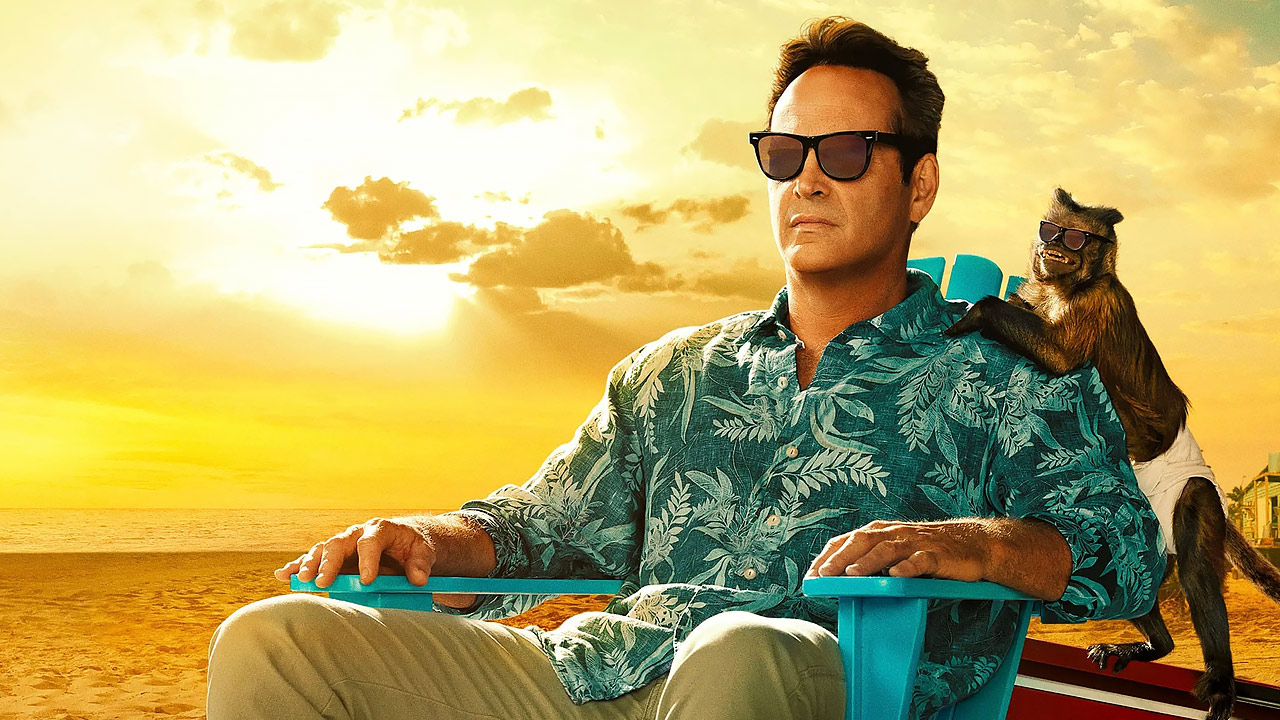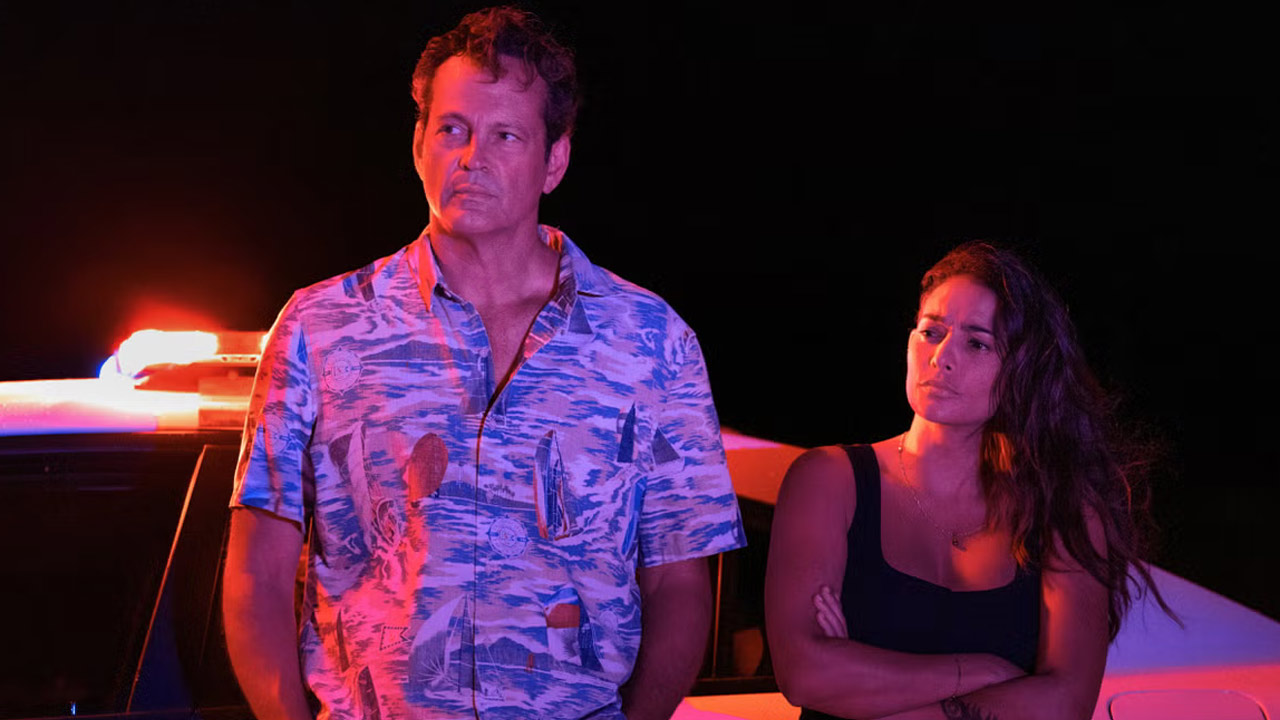Is Bad Monkey the most purely enjoyable crime show of the year?
Vince Vaughn is immensely entertaining as a former detective determined to solve a case involving a severed arm.

Vince Vaughn plays a down-and-out former detective in this funny and charmingly lowkey show, which “goes down very smoothly, like a milky cocktail,” writes Luke Buckmaster.
A severed arm with an erect middle finger is the leitmotif of Bad Monkey—not just a recurring image but a visual distillation of the show’s gallows humour. This very entertaining crime series—created by Bill Lawrence, who also created Scrubs and co-created Ted Lasso—exists in a hazy half-reality, as if the production itself has had one drink or spliff too many and fried in the sun—too tired to think properly, too buzzed to go to bed. Vince Vaughn’s protagonist Andrew Yancy, a suspended Miami police detective turned restaurant inspector, is told that the flipping the bird thing is just “random rigor mortis.” And indeed the entire series feels quite random, very enjoyably so, written and staged with a daffy laidback charm.
Core to Bad Monkey’s appeal is Vaughn’s extremely downplayed performance: he casualises everything, making the role his own while pretending that this requires absolutely no effort. Tom Nowicki’s gruff all-American narrator, sounding like a chatty barfly unwilling to surrender his audience, describes Yancy as “simple man” who “enjoys simple pleasures,” such as a drink and a chair with a view. But Yancy is unhappy about being stripped of his badge, and figures that if he solves the case of the severed arm he’ll be reinstated as a cop.
The accepted narrative is that said arm belongs to a man killed in a fishing accident. Yancy correctly senses that something’s a bit off, though this hardly requires superhuman intuition: the widow of the deceased, Meredith Hagner’s Eve Stripling, doesn’t seem remotely sad, let alone in mourning. I’m loath to mention much more about the plot—which was adapted from Carl Hiaasen’s novel of the same name—lest we veer into spoiler land. Suffice to say that things get rather twisty as Yancy, teaming up with medical examiner Rosa (Natalie Martinez), quickly discovers things aren’t as they seem.
The other primary plotline, more or less disconnected for the majority of the show’s 10 episode season, takes place in the Bahamas and follows Ronald Peet’s Neville Stafford, a fisherman with a pet monkey (yes: the eponymous one) who’s determined to stop developers demolishing his house, and Jodie Turner-Smith’s enigmatic “Dragon Queen,” a mover and shaker on the island—part mystic, part gangster. It’s best to let the show explain the connection between these threads and Yancy’s.
The story’s entertaining but most of Bad Monkey’s pleasures come from tone and tempo. From the start it has a screwy charm and seems quite happy to get distracted from its own plotlines. The narrative arcing is knotty and erratic, but rhythmically the show flows swimmingly and goes down very smoothly, like a milky cocktail. It’s rare for any scene to overstay its welcome and the directors (Marcos Siega, Colin Bucksey, Erica Dunton, Liz Friedlander and Sam Jones) and writers (Matt Tarses, Milla Bell-Hart, Ashley Nicole Black, Brian C. Brown, Ellie Knaus, Michael C. Martin, Annie Mebane and Adam Sztykiel) have some cards up their sleeves to counter potential dips and slow spots.

One is the aforementioned narrator; whenever the pace might have waned, they can insert him and keep it jiving. He regularly interjects, sometimes adding backstory details; sometimes taking us out of the narrative in ways that he assures us will make sense eventually; sometimes to make playfully empty comments like “10 bucks if you can guess what happens next.” He’s funny (but not funny ha-ha) and never seems to be trying too hard.
Plus of course there’s Yancy’s character and Vaughn’s performance, the writing and acting merging beautifully. Yancy is an own-worst-enemy type: a masochist and magnet for trouble, terrible at letting things go. He’s usually aware of the sensible thing to do—and equally aware he won’t be doing it. Yancy’s the sort of guy who, when he smokes weed, buys the strain called “train wreck.” Vaughn fits the role like a glove, completely taking the edge off—in a good way—lines like “it’s a cold business when true love goes south.” Droll scripting affords him the right amount of space to mold the role in his image, or just cruise through to the next moment. Here’s a small example of one exchange from episode three.
Yancy: I usually steer clear of married women. But Bonnie was smart, worldly. It was exciting.
Rosa: She was also a kid-fucking sociopath.
Andrew: I said exciting.
Creating that kind of lightly written, smart arse-y dialogue (presumably cribbed from Hiaasen’s novel) isn’t as easy as it sounds. Bad Monkey is sprinkled with moments like the above, many interactions engineered to culminate with Yancy having a conversational upperhand. I smashed through the entire season and, although I have some reservations about the way things wrapped up—during the final episode in particular—I never tired of his antics.
























